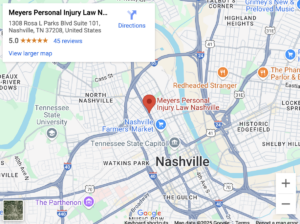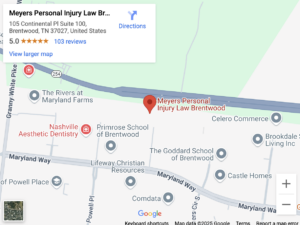Meyers Personal Injury Law | January 24, 2024 | Car Accidents

When involved in an automobile accident, one of the immediate concerns is the timeframe within which the incident must be reported to the relevant authorities or insurance companies. This reporting period can vary considerably depending on the location of the accident, the severity of the incident, and the policies of the insurance carriers involved. Certain jurisdictions have specific legal requirements that dictate the timing for reporting a car accident to the local law enforcement or the department of motor vehicles.
Understanding the legal obligations for reporting an accident is crucial, as failure to do so within the stipulated timelines can result in penalties, including fines and potential difficulties with future insurance claims. Most states require that an accident be reported if it involves injury, death, or significant property damage. Insurance providers also have their own reporting requirements, often necessitating that policyholders report an accident as soon as it is safely possible to ensure coverage.
The importance of timely reporting extends beyond legal compliance; it also plays a significant role in the accuracy of the accident report and the effectiveness of the subsequent insurance claim process. Prompt reporting allows for immediate investigation, which can lead to a clearer understanding of the event, and helps to ensure that the details are recorded accurately while still fresh in the minds of those involved.
Legal Requirements by Jurisdiction
The timeframe for reporting a vehicle accident varies between jurisdictions and is governed by specific state laws as well as federal regulations. Ensuring compliance with these laws is crucial for legal and insurance processes.
State-Specific Laws
For state reporting requirements, refer to the individual state’s Department of Motor Vehicles (DMV) or equivalent authority for the most accurate information. Here is a concise list presenting the variation in reporting requirements for a selection of states:
- California: Accidents must be reported to the DMV within 10 days if there is an injury, death, or property damage exceeds $1,000.
- New York: Motorists must file a report to the DMV when property damage is over $1,000 or if there are any injuries, within 10 days.
- Texas: The time limit for reporting is within 10 days for accidents involving injury, death, or property damage exceeding $1,000.
It is important to check the specifics for each state as some may have different thresholds for property damage or other criteria that trigger the need for a report.
Federal Reporting Obligations
At the federal level, the National Highway Traffic Safety Administration (NHTSA) requires that certain accidents be reported, focusing on commercial vehicles and those involving hazardous materials. For instance:
- Commercial Vehicles: Accidents involving commercial vehicles may need to be reported immediately under the Commercial Vehicle Safety Alliance criteria.
- Hazardous Materials: Any accident involving the transport of hazardous materials must be reported immediately to local authorities and the Department of Transportation (DOT).
These guidelines represent only a portion of the requirements, and carriers or individuals should consult federal regulations for complete directives.
Immediate Actions Post-Accident in Tennessee
After a vehicle accident, individuals involved are required to take certain actions immediately to ensure legal compliance and safety. These actions can be split into two crucial categories: on-site procedures and information exchange.
On-Site Procedures
At the scene of the accident, safety is the primary concern. Individuals should check for injuries and call emergency services if there are any. Moving vehicles out of traffic to a safe area is advised if it is possible and safe to do so. It’s important to set up hazard lights or road flares to warn other motorists of the incident. Unless necessary for safety or instructed by law enforcement, vehicles should not be moved.
- Safety Measures:
- Assess injuries; call 911 if needed.
- Move vehicles if safe; else, turn on hazard lights.
- Use road flares for visibility if available.
- Documentation:
- Take photographs of the scene, including all vehicles involved, damage, and road conditions.
- Make notes of the accident details: time, location, and weather conditions.
Information Exchange
The individuals involved must exchange information vital for insurance and legal processes. This includes personal contact information, vehicle details, and insurance data. Both parties should share:
- Personal Information:
- Full names and contact details.
- Driver’s license numbers.
- Vehicle Information:
- Make, model, and year of the vehicles.
- License plate numbers.
- Insurance Information:
- Company name and policy number.
Each individual should also collect information from any witnesses and make note of the responding law enforcement officers’ names and badge numbers. It is important not to admit fault or make statements that could be construed as such during the exchange.
Reporting Timeline
It is critical for individuals involved in traffic accidents to understand the specific time frames within which they must report these incidents to the appropriate authorities.
Standard Time Frame
The standard time frame for reporting an accident typically ranges from 24 hours to a few days after the event, depending on jurisdictional regulations. The exact time limit can vary by state or country, but immediate reporting is often encouraged for several reasons, including:
- Legal requirements: Most regions legally mandate the prompt reporting of accidents, especially those involving injuries, significant property damage, or death.
- Insurance claims: Timely reporting is crucial for insurance purposes, as delays can complicate the claims process.
Exceptions to Reporting Deadlines
There are exceptions to standard reporting deadlines that may extend the time individuals have to report an accident:
- Injury or incapacitation: If someone is physically unable to report due to injuries sustained in the accident, the deadline may be extended until they are capable of doing so.
- Unattended vehicle damage: If a vehicle is hit while unattended, some regions allow additional time for the owner to discover the damage and report the incident.
Understanding these parameters is crucial to ensure compliance with legal obligations and to facilitate a smooth insurance claim process.
Consequences of Late Reporting
Reporting an accident after the recommended timeframe may have direct consequences on one’s insurance status and legal standing.
Insurance Implications
When an individual delays in reporting a car accident to their insurance company, they may face several setbacks. Most insurance policies stipulate a specific period, often ranging from 24 hours to 30 days, within which an accident must be reported for a claim to be considered valid. Failure to report within this timeframe can result in:
- Claim Denial: The insurer may refuse to cover damages due to late reporting.
- Premium Increases: If the claim is accepted, there may still be a significant rise in insurance premiums.
- Policy Cancellation: In some cases, the insurance company might cancel the policy for non-compliance with its terms.
Legal Penalties
The legal system often mandates reporting an accident to the authorities within a set time, which can vary by jurisdiction. The consequences of not adhering to these regulations typically include:
- Fines: Depending on the local laws, individuals may be fined for late reporting.
- License Suspension: In severe cases, driving licenses can be suspended as a form of penalty.
- Criminal Charges: If the accident involves serious injuries or fatalities, failing to report in a timely manner may lead to criminal charges.
Special Circumstances
In some instances, reporting an accident may involve additional legal considerations or mandate swift action due to the nature of the incident.
Hit and Run Incidents
In the case of a hit and run, individuals should report the incident immediately to law enforcement. The legal time frame for reporting these incidents varies by jurisdiction, but promptness can be crucial for investigation and potential restitution.
Unattended Vehicle Damage
When a vehicle suffers damage while unattended, the responsible party should leave their contact information in a visible location on the damaged vehicle. If this doesn’t happen, the owner of the damaged vehicle should report the incident to local law enforcement and their insurance company as soon as the damage is discovered.
Documenting an Accident
When an accident occurs, one’s immediate steps should include gathering evidence at the scene and ensuring prompt filing of a police report to establish a well-documented account of the event.
Gathering Evidence
- Take Photos: Capture images of the vehicles involved, including license plates, damage, and the surrounding area.
- Collect Information: Exchange contact and insurance details with the other parties.
- Witness Statements: If witnesses are present, obtain their names and contact details.
- Environmental Conditions: Record the time, weather, and road conditions at the time of the accident.
Filing a Police Report
- Report Immediately: Contact law enforcement at the scene if possible; this ensures an official report is filed.
- Provide Accurate Information: Share all evidence collected with the police to contribute to an accurate report.
- Obtain a Copy: Request a copy of the police report for personal records.
Insurance Claims Process
In the event of an automobile or truck accident throughout Tennessee, timely reporting to an insurance company is crucial for a smooth claims process. This section outlines each step from initiating a claim to collaborating with adjusters.
Initiating a Claim
Upon being involved in an accident, the policyholder must promptly contact their insurance provider to begin the claims process. They should have their policy number, accident details, and any other parties’ insurance information readily available. The policyholder will be required to fill out a claim form, either online or over the phone, providing specific details about the accident and the damages incurred.
| Information Required | Description |
|---|---|
| Policy Number | Unique identifier of the insurance policy. |
| Accident Details | Date, time, location, and description of the incident. |
| Damage Description | Extent and nature of the vehicle damage. |
| Other Parties’ Information | Insurance details of all involved parties. |
Working with Adjusters
Once a claim is initiated, an insurance adjuster is assigned to the case. They assess the damages, review accident reports, and determine the amount of money required to cover the repairs. It is the adjusters’ responsibility to ensure that all assessments are fair and accurate. They may require the policyholder to take the vehicle to a certified mechanic or body shop to obtain a repair estimate.
- Review: Adjusters thoroughly evaluate the provided information.
- Estimation: They may visit the scene or review photographic evidence.
- Verification: Verification of repair costs and other expenses is necessary.
Communication with the adjuster should remain open and honest. They serve as the primary point of contact between the insurance company and the policyholder throughout the claim resolution process.
Legal Assistance and Advice
Seeking professional guidance after an accident is crucial in understanding the legal timeframe for reporting and can significantly affect the outcome of any claims or disputes that arise.
Consulting an Attorney
When to Consult:
- Immediately After an Accident: Prompt consultation ensures critical evidence and witness statements are preserved.
- Before Signing Any Documents: An attorney can clarify terms and prevent the signing away of important rights.
Benefits:
- Expert Advice: Tailored to the specific circumstances of the accident.
- Negotiation Skills: Car accident attorneys are trained to negotiate with insurance companies.
Understanding Your Rights
Key Rights to Be Aware Of:
- Time Limits: Each state has different statutes of limitations for filing accident claims.
- Compensation: Individuals are entitled to claim for damages, medical bills, loss of income, and pain and suffering, among others.
State Laws:
- Vary significantly from state to state.
- Dictate what you are legally entitled to following an accident.
Documenting an Accident:
- Essential to maintain accurate records.
- Includes police reports, medical records, and communication with insurance companies.
Contact Our Nashville Personal Injury Law Firm Today at Meyers Personal Injury Law
If you were injured in an accident in Nashville or Brentwood, and need legal help, contact our Nashville personal injury lawyers at Meyers Personal Injury Law to schedule a free case review today.
Meyers Personal Injury Law Nashville
1308 Rosa L Parks Blvd Suite 101,
Nashville, TN 37208
(615) 258-9000
Meyers Personal Injury Law Brentwood
105 Continental Pl Suite 100,
Brentwood, TN 37027
(615) 258-9000



